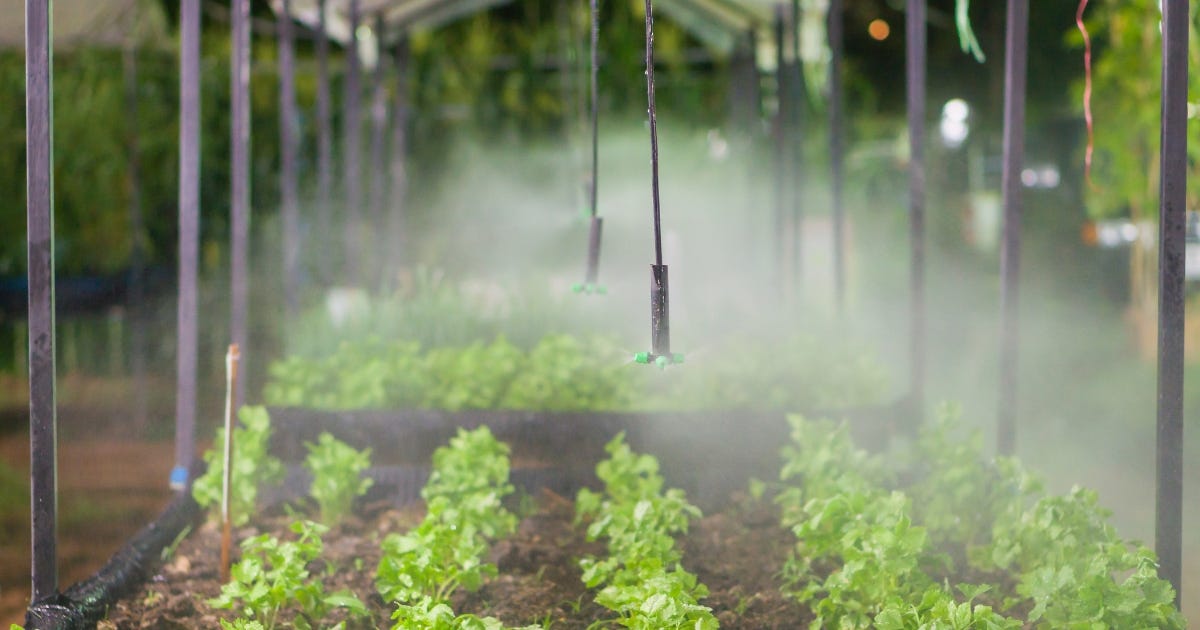This article originally appeared on Jon Fleetwood’s Substack and was republished with permission.
Guest post by Jon Fleetwood
Flagship Pioneering, the company that founded Moderna, is now genetically programming crops with synthetic RNA sprays designed to persist in plant tissue.
Flagship Pioneering—the biotech firm that founded Moderna—has launched a new company called Terrana Biosciences to spray crops with RNA designed to “actually go inside the plant,” move through its internal systems, persist under extreme environmental conditions, and become “heritable across plant generations,” using synthetic RNA constructs generated from “a vast library of RNAs” built with “advanced AI and computational models.”
Flagship Pioneering was originally founded as NewcoGen in 1999 by Noubar Afeyan and Ed Kania.
Afeyan, as founder and CEO and co-founder of Moderna, has established significant collaborations with U.S. government agencies such as NIAID, HHS, BARDA, FDA, and Operation Warp Speed, notably contributing to Moderna’s COVID-19 vaccine development.
News of Moderna’s new crop-spraying technology comes as EcoHealth Alliance’s DEFUSE proposal to DARPA is under renewed scrutiny for detailing plans to aerosolize chimeric coronavirus spike proteins, immune modulators, and self-spreading vaccines over humans using drones.
Those technologies were developed before the COVID pandemic, raising the question of whether the pandemic marked the covert launch of a premeditated biological spray operation—one that tested drone-based aerosol delivery of COVID-related substances on human populations under the guise of a global health emergency.
Whistleblower testimony and FOIA documents revealed that they included wide-area inoculation platforms described as suitable for “large area inoculation of animals/humans.”
Moreover, the PREP Act empowers the U.S. government to secretly administer drugs, biological products, and medical devices to the public during a declared emergency—without consent, geographic limits, legal accountability, or any obligation to disclose such actions if deemed classified for national defense.
According to Flagship Pioneering’s new press release, published earlier this month:
Flagship Pioneering, the bioplatform innovation company, today unveiled Terrana Biosciences™, a company pioneering RNA-based agricultural solutions to deliver protective and enhanced crop traits without altering the plant genome. Through its proprietary RNA technology platform, Terrana is developing targeted products designed to work at any time in a plant’s lifecycle, enabling a continuous product pipeline that is adaptive and responsive to variable climate conditions and capable of generating new solutions at a fraction of the time and cost associated with conventional agriculture approaches. Flagship has initially committed $50 million to Terrana to scale operations and develop its first products in crop protection and yield.
Built on the Moderna Model
Flagship Pioneering explicitly links its crop RNA platform to the same RNA inventions used in human medicine.
“With Terrana, we are bringing an entirely new dimension of innovation to agriculture through similar RNA technology that we pioneered in human health,” said CEO Afeyan. “This approach will empower farmers with precise, adaptive solutions to combat threats to crops in fields and orchards and enhance resiliency, sustainability, and productivity in the global food system.”
#ad: Your diet isn’t perfect—and that’s okay.
Global Healing’s Organic Multivitamin is here to help you fill the gaps with over 30 essential vitamins and minerals your body needs to feel its best.
There are no coatings, no fillers—just clean, high-quality nutrients your body can actually use. It’s a simple, effective way to support your daily health and give your body the care it deserves.
Experience the difference you can actually feel. Use code VFOX at checkout for 10% off your order.
DISCLOSURE: This is an affiliate link. I may earn a commission if you make a purchase here, at no additional cost to you.
Sprayed RNA That Enters & Moves Through the Plant
In a July 2 interview with AgFunderNews, Terrana CEO Ryan Rapp explained how the company’s sprayable RNA differs from traditional applications.
According to AgFunderNews:
As the founder of Moderna and other human health-focused companies, Flagship Pioneering has a long history of working with RNA-based products and technologies.
Terrana is an opportunity to apply that RNA knowledge to the agriculture space, says Rapp.
“The biggest challenge [in agriculture] in the past has been that when RNA has been applied, it’s typically been messenger RNA, or double-stranded RNAs, sometimes hairpins,” says Rapp.
Instead of entering the plant, these RNA molecules sit on the leaves and degrade quickly.
“The difference with Terrana’s technology is it actually goes inside the plant,” he says. “That really lets you think about solving problems differently.”
Engineered to Persist, Spread, & Possibly Inherit
According to Flagship’s press release:
“Terrana’s solutions are fine-tuned for amplification, mobility in plants, stability in different environments, and heritability across plant generations.”
Designed by AI, Modeled After Nature’s Own RNA
The company describes its system as mimicking the plant’s natural signaling network:
“Trees and crops naturally use a vast ecosystem of self-replicating RNAs to influence trait expression. These native RNAs are abundant, diverse, and are already part of the plant’s own biology, functioning like a native language that helps to communicate traits like growth, stress response, and development.”
Terrana has already created dozens of synthetic RNAs:
“Terrana has assembled a vast library of RNAs and built a design system that enables efficient assembly of novel functional crop traits, generated with unprecedented precision, versatility and speed. The platform has already created three novel technology classes, demonstrated proof of concept in tomatoes, corn, and soy, and generated a pipeline of 15+ potential products in specialty and row crops.”
Terrana plans to expand its RNA technology—originally used in human health—across a wide range of agricultural applications, including both annual and perennial crops.
“RNA-based technology has delivered lifesaving advancements in human health. We are now applying this same approach to reimagine what’s possible for agriculture,” said Ignacio Martinez, Co-Founder and Executive Chairman of Terrana and General Partner at Flagship Pioneering. “Using the language of nature, we can give plants new instructions, yielding adaptable solutions rooted directly in the plant’s natural physiology. Our approach opens a new world of possibilities in annual and perennial crops for the benefit of farmers, people and the planet.”
But if synthetic RNA can now be sprayed onto crops to rewrite plant biology from the inside out—persisting, spreading, and potentially passing between generations—what’s stopping these same biotech and government players from deploying similar programmable agents across ecosystems, food supplies, or even populations, without our knowledge or consent?
And if these synthetic RNAs persist in plant tissue and circulate through food systems, what are the long-term health consequences of chronic human exposure to AI-designed genetic instructions originally engineered for manipulation, not nourishment?
Copyright 2025 Jon Fleetwood




Why is nobody in the political position shutting this down ASAP wtf is wrong with these DEI fkg idiots. this is ALL WITH OUT Consent🤬 WHERE ARE THE LAW SUITES TO STALL THIS F***** NUT JOB.!!!!
Insanity.